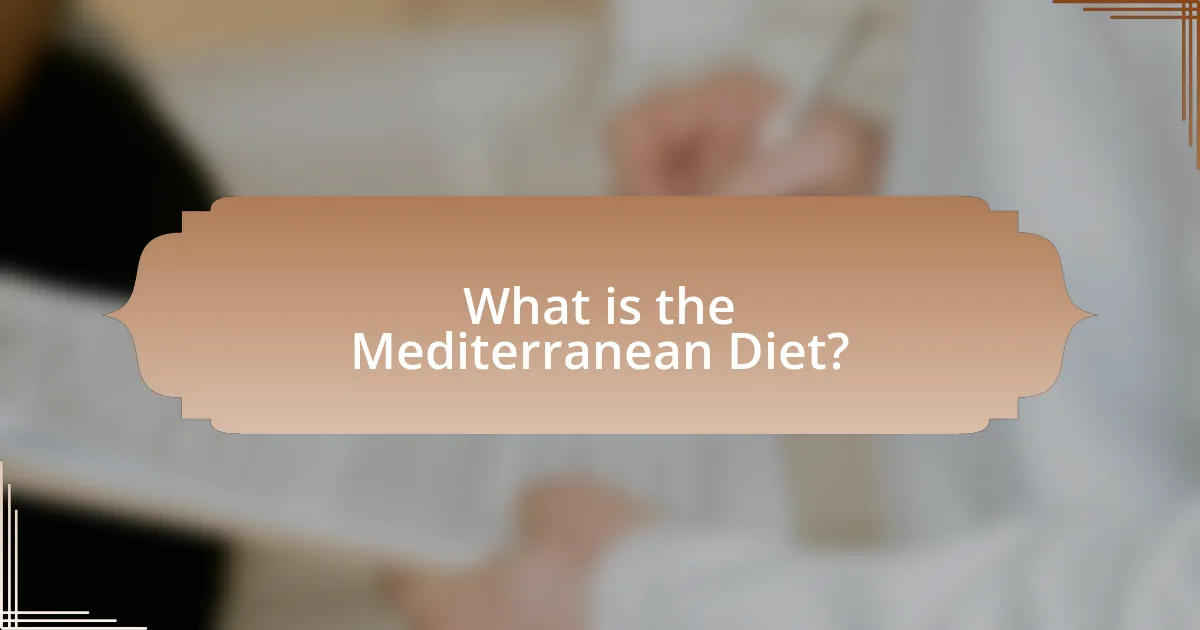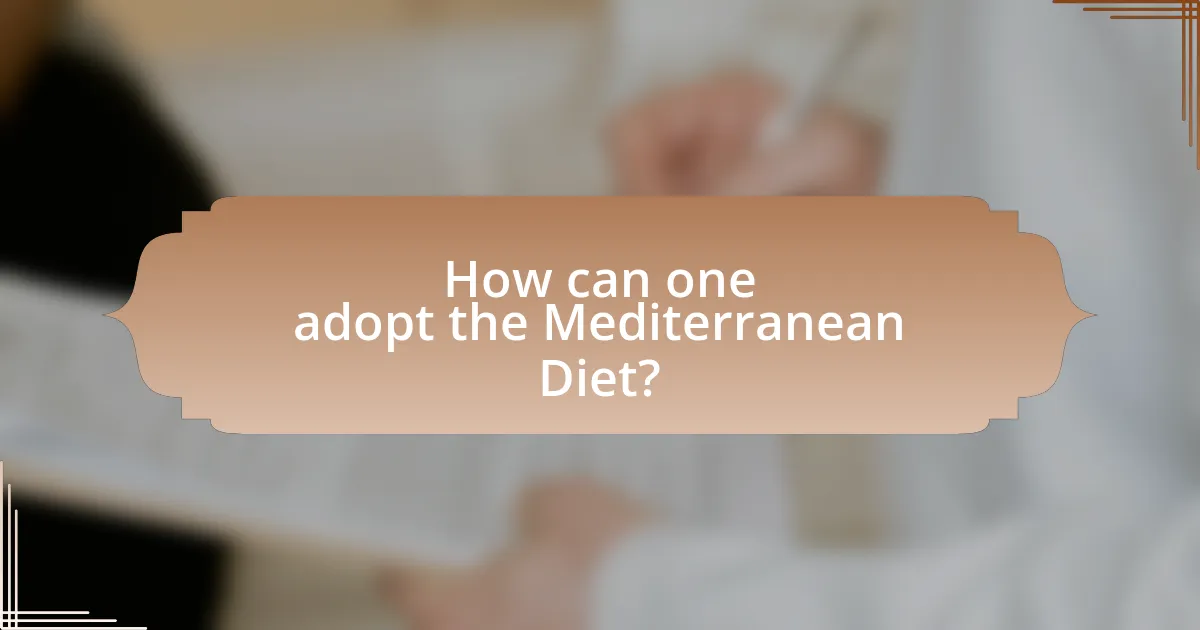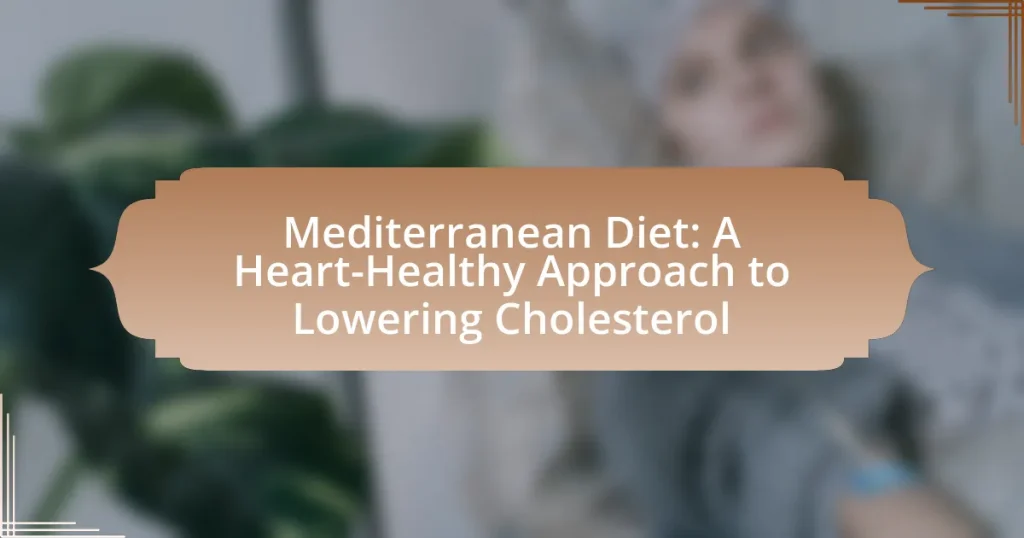The Mediterranean Diet is a dietary pattern inspired by the traditional eating habits of countries bordering the Mediterranean Sea, focusing on fruits, vegetables, whole grains, legumes, nuts, and olive oil, while limiting red meat and processed foods. This diet is linked to numerous health benefits, particularly in promoting heart health and lowering cholesterol levels, as supported by scientific studies such as the PREDIMED trial. Key components include healthy fats, fiber, and antioxidants, which contribute to improved lipid profiles and reduced cardiovascular risks. The article will explore the diet’s components, its impact on heart health, and practical steps for adopting this heart-healthy approach.

What is the Mediterranean Diet?
The Mediterranean Diet is a dietary pattern inspired by the traditional eating habits of countries bordering the Mediterranean Sea, emphasizing the consumption of fruits, vegetables, whole grains, legumes, nuts, and olive oil, while limiting red meat and processed foods. This diet is associated with numerous health benefits, including reduced risk of heart disease and lower cholesterol levels, as evidenced by studies such as the PREDIMED trial, which demonstrated that adherence to the Mediterranean Diet significantly decreased cardiovascular events among participants.
How does the Mediterranean Diet promote heart health?
The Mediterranean Diet promotes heart health primarily through its emphasis on healthy fats, whole grains, fruits, vegetables, and lean proteins. This diet is rich in monounsaturated fats, particularly from olive oil, which has been shown to lower bad cholesterol levels (LDL) while raising good cholesterol levels (HDL). Research published in the New England Journal of Medicine indicates that adherence to the Mediterranean Diet can reduce the risk of cardiovascular events by approximately 30% compared to a low-fat diet. Additionally, the high intake of antioxidants from fruits and vegetables helps combat oxidative stress, further supporting cardiovascular health.
What are the key components of the Mediterranean Diet?
The key components of the Mediterranean Diet include a high intake of fruits, vegetables, whole grains, legumes, nuts, and olive oil, along with moderate consumption of fish and poultry, and limited intake of red meat and dairy. This diet emphasizes plant-based foods and healthy fats, which contribute to cardiovascular health and lower cholesterol levels. Research indicates that adherence to the Mediterranean Diet is associated with a reduced risk of heart disease, as evidenced by studies published in the New England Journal of Medicine, which found that participants following this diet had a 30% lower risk of cardiovascular events compared to those on a low-fat diet.
How do these components contribute to lowering cholesterol?
Components of the Mediterranean diet, such as healthy fats, fiber, and antioxidants, contribute to lowering cholesterol by promoting better lipid profiles and reducing inflammation. Healthy fats, particularly monounsaturated fats found in olive oil and nuts, help increase high-density lipoprotein (HDL) cholesterol while lowering low-density lipoprotein (LDL) cholesterol. Fiber, especially soluble fiber from fruits, vegetables, and whole grains, binds to cholesterol in the digestive system, facilitating its excretion. Antioxidants from fruits and vegetables combat oxidative stress, which can lead to cholesterol oxidation and plaque formation in arteries. Studies have shown that adherence to the Mediterranean diet is associated with a significant reduction in total cholesterol levels and improved cardiovascular health.
Why is the Mediterranean Diet considered heart-healthy?
The Mediterranean Diet is considered heart-healthy primarily due to its emphasis on whole foods, healthy fats, and nutrient-rich ingredients that support cardiovascular health. This diet includes high amounts of fruits, vegetables, whole grains, legumes, nuts, and olive oil, which are rich in antioxidants and healthy monounsaturated fats. Research has shown that adherence to the Mediterranean Diet is associated with a reduced risk of heart disease, as evidenced by a study published in the New England Journal of Medicine, which found that participants following this diet had a 30% lower risk of major cardiovascular events compared to those on a low-fat diet. Additionally, the diet’s low intake of red meat and processed foods further contributes to lower cholesterol levels and improved heart health.
What scientific studies support the heart health benefits of the Mediterranean Diet?
The Mediterranean Diet is supported by numerous scientific studies that demonstrate its heart health benefits. One significant study is the PREDIMED trial, published in the New England Journal of Medicine in 2013, which involved over 7,400 participants at high cardiovascular risk. This study found that individuals following a Mediterranean Diet supplemented with extra-virgin olive oil or nuts had a 30% lower risk of major cardiovascular events compared to those on a low-fat diet. Another important study, published in the Journal of the American College of Cardiology in 2018, indicated that adherence to the Mediterranean Diet was associated with a reduced risk of coronary heart disease and stroke. Additionally, a meta-analysis published in the British Journal of Nutrition in 2019 confirmed that the Mediterranean Diet significantly lowers blood pressure and improves lipid profiles, further supporting its role in promoting heart health.
How does the Mediterranean Diet compare to other diets in terms of heart health?
The Mediterranean Diet is superior to many other diets in promoting heart health due to its emphasis on whole foods, healthy fats, and plant-based ingredients. Research indicates that adherence to the Mediterranean Diet is associated with a 30% lower risk of cardiovascular disease compared to diets high in processed foods and saturated fats. A study published in the New England Journal of Medicine found that participants following the Mediterranean Diet experienced significant reductions in heart disease risk factors, including lower cholesterol levels and improved blood pressure. This diet’s focus on olive oil, nuts, fruits, vegetables, and whole grains contributes to its heart-protective effects, making it a leading choice for cardiovascular health.

What foods are included in the Mediterranean Diet?
The Mediterranean Diet includes a variety of foods such as fruits, vegetables, whole grains, legumes, nuts, seeds, olive oil, fish, and moderate amounts of dairy, particularly yogurt and cheese. This diet emphasizes plant-based foods and healthy fats, while limiting red meat and processed foods. Research indicates that adherence to the Mediterranean Diet is associated with lower cholesterol levels and reduced risk of heart disease, as evidenced by studies published in journals like the New England Journal of Medicine, which highlight its cardiovascular benefits.
Which fruits and vegetables are staples in the Mediterranean Diet?
Staples in the Mediterranean Diet include a variety of fruits and vegetables such as tomatoes, cucumbers, bell peppers, eggplants, olives, citrus fruits, and leafy greens. These foods are integral to the diet due to their high nutritional value and health benefits, including antioxidants and fiber. Research indicates that the Mediterranean Diet, rich in these fruits and vegetables, is associated with lower cholesterol levels and reduced risk of heart disease, as evidenced by studies published in journals like the American Journal of Clinical Nutrition.
How do these fruits and vegetables impact cholesterol levels?
Fruits and vegetables significantly lower cholesterol levels by providing soluble fiber, antioxidants, and healthy fats. Soluble fiber, found in foods like oats, apples, and beans, binds to cholesterol in the digestive system, facilitating its excretion and thereby reducing overall cholesterol levels. Antioxidants present in fruits and vegetables, such as flavonoids and carotenoids, help reduce inflammation and oxidative stress, which are linked to heart disease. Additionally, healthy fats from sources like avocados and olives can improve lipid profiles by increasing high-density lipoprotein (HDL) cholesterol, often referred to as “good” cholesterol. Studies have shown that adherence to a Mediterranean diet, rich in fruits and vegetables, is associated with lower levels of total cholesterol and LDL cholesterol, contributing to better cardiovascular health.
What role do whole grains play in the Mediterranean Diet?
Whole grains are a fundamental component of the Mediterranean Diet, contributing to its health benefits, particularly in lowering cholesterol levels. Whole grains, such as barley, oats, and whole wheat, provide essential nutrients, including fiber, which helps reduce LDL cholesterol and improve heart health. Research indicates that diets rich in whole grains can lower the risk of cardiovascular diseases; for instance, a study published in the American Journal of Clinical Nutrition found that higher whole grain intake is associated with a 25% reduction in the risk of heart disease. Thus, whole grains play a crucial role in promoting cardiovascular health within the Mediterranean Diet framework.
What types of fats are emphasized in the Mediterranean Diet?
The Mediterranean Diet emphasizes monounsaturated fats, particularly from sources like olive oil, nuts, and avocados. These fats are known to improve heart health by reducing bad cholesterol levels and increasing good cholesterol levels. Research indicates that diets rich in monounsaturated fats can lower the risk of cardiovascular diseases, supporting the diet’s reputation as a heart-healthy approach.
How do healthy fats from olive oil and nuts affect heart health?
Healthy fats from olive oil and nuts positively affect heart health by reducing bad cholesterol levels and inflammation. Olive oil, rich in monounsaturated fats, has been shown to lower LDL cholesterol while increasing HDL cholesterol, which is beneficial for cardiovascular health. Studies, such as one published in the New England Journal of Medicine, found that a Mediterranean diet high in olive oil significantly reduced the risk of heart disease. Similarly, nuts contain omega-3 fatty acids and antioxidants that contribute to improved heart health by lowering blood pressure and reducing inflammation. Research published in the American Journal of Clinical Nutrition indicates that regular nut consumption is associated with a lower risk of heart disease.
What is the significance of omega-3 fatty acids in this diet?
Omega-3 fatty acids are significant in the Mediterranean diet due to their role in promoting heart health and lowering cholesterol levels. These essential fats help reduce triglycerides, lower blood pressure, and decrease the risk of heart disease, which aligns with the Mediterranean diet’s focus on cardiovascular health. Research indicates that populations consuming a diet rich in omega-3s, such as those found in fatty fish, nuts, and seeds, experience lower rates of cardiovascular events. For instance, a study published in the Journal of the American College of Cardiology found that omega-3 supplementation significantly reduced the risk of heart attacks and strokes.

How can one adopt the Mediterranean Diet?
To adopt the Mediterranean Diet, one should focus on consuming primarily plant-based foods, healthy fats, whole grains, and lean proteins. This diet emphasizes fruits, vegetables, legumes, nuts, seeds, and olive oil as the main sources of nutrition, while limiting red meat and processed foods. Research indicates that following this diet can lead to improved heart health and lower cholesterol levels, as evidenced by a study published in the New England Journal of Medicine, which found that participants adhering to the Mediterranean Diet had a 30% lower risk of cardiovascular events compared to those on a low-fat diet.
What are practical steps to start following the Mediterranean Diet?
To start following the Mediterranean Diet, incorporate more fruits, vegetables, whole grains, legumes, nuts, and healthy fats, particularly olive oil, into your meals. This diet emphasizes plant-based foods, which are rich in fiber and antioxidants, contributing to heart health and cholesterol management. Research indicates that adherence to the Mediterranean Diet can lower the risk of cardiovascular diseases by promoting healthy cholesterol levels and reducing inflammation. Additionally, limit red meat and processed foods while enjoying fish and poultry in moderation, aligning with the diet’s principles of balanced nutrition and healthy eating habits.
How can meal planning facilitate adherence to the Mediterranean Diet?
Meal planning facilitates adherence to the Mediterranean Diet by providing structure and organization, which helps individuals consistently incorporate its key components. By planning meals in advance, individuals can ensure they include a variety of fruits, vegetables, whole grains, legumes, nuts, and healthy fats, which are essential for this diet. Research indicates that structured meal planning can lead to improved dietary quality and adherence to nutritional guidelines, as it reduces impulsive food choices and promotes the preparation of healthier meals at home. This approach aligns with findings from studies such as the one published in the Journal of Nutrition, which highlights that meal planning is associated with better dietary habits and increased consumption of foods recommended in the Mediterranean Diet.
What are some easy Mediterranean recipes to try?
Some easy Mediterranean recipes to try include Greek salad, hummus, and pasta with olive oil and garlic. Greek salad combines tomatoes, cucumbers, olives, and feta cheese, providing a refreshing dish rich in vitamins and healthy fats. Hummus, made from blended chickpeas, tahini, lemon juice, and garlic, serves as a nutritious dip high in protein and fiber. Pasta with olive oil and garlic is a simple yet flavorful dish that highlights the use of healthy fats and fresh ingredients, aligning with the principles of the Mediterranean diet, which emphasizes heart health and cholesterol management.
What challenges might one face when transitioning to the Mediterranean Diet?
Transitioning to the Mediterranean Diet can present challenges such as adjusting to new food choices, overcoming cultural habits, and managing meal preparation. Individuals may struggle with replacing familiar foods with staples like whole grains, fruits, vegetables, and healthy fats, which are central to this diet. Additionally, many people may find it difficult to shift away from processed foods and high-sugar items that are prevalent in their current diets. Research indicates that dietary changes often require time and commitment, as habits formed over years can be hard to break. Furthermore, the Mediterranean Diet emphasizes cooking with fresh ingredients, which may necessitate learning new recipes and cooking techniques, potentially leading to frustration for those accustomed to convenience foods.
How can one overcome common obstacles in adopting this diet?
To overcome common obstacles in adopting the Mediterranean diet, individuals can start by gradually incorporating its principles into their meals. This approach allows for a smoother transition, making it easier to adapt to new foods and cooking methods. Research indicates that gradual dietary changes are more sustainable; a study published in the Journal of Nutrition found that individuals who made incremental changes were more likely to maintain those changes long-term. Additionally, planning meals ahead of time and preparing a shopping list can help avoid impulse purchases of less healthy options, reinforcing commitment to the diet. Engaging in community support, such as joining cooking classes or online forums focused on the Mediterranean diet, can also provide motivation and practical tips, further facilitating the adoption process.
What resources are available for support and guidance?
Resources available for support and guidance on the Mediterranean Diet include dietary guidelines from health organizations, online platforms offering meal plans and recipes, and community support groups. The American Heart Association provides comprehensive resources on heart-healthy eating, including specific recommendations for the Mediterranean Diet. Additionally, websites like the Oldways Mediterranean Diet provide educational materials, recipes, and tips for adopting this dietary approach. Research published in the New England Journal of Medicine highlights the effectiveness of the Mediterranean Diet in reducing cardiovascular risk, reinforcing the value of these resources for individuals seeking to lower cholesterol.
What tips can help maximize the benefits of the Mediterranean Diet?
To maximize the benefits of the Mediterranean Diet, individuals should prioritize whole, minimally processed foods, including fruits, vegetables, whole grains, legumes, nuts, and healthy fats like olive oil. Research indicates that adhering to these dietary components can significantly lower cholesterol levels and improve heart health. For instance, a study published in the New England Journal of Medicine found that participants following a Mediterranean diet supplemented with extra-virgin olive oil or nuts had a 30% lower risk of cardiovascular events compared to those on a low-fat diet. Additionally, incorporating regular physical activity and maintaining a balanced lifestyle further enhances the positive effects of this diet on overall health.
How can portion control enhance the effectiveness of the Mediterranean Diet?
Portion control enhances the effectiveness of the Mediterranean Diet by promoting balanced nutrient intake and preventing overeating. This diet emphasizes whole foods such as fruits, vegetables, whole grains, and healthy fats, which can be calorie-dense. By controlling portion sizes, individuals can better manage their caloric intake, leading to weight loss or maintenance, which is crucial for heart health. Research indicates that maintaining a healthy weight significantly reduces the risk of cardiovascular diseases, aligning with the Mediterranean Diet’s goals of lowering cholesterol and improving overall heart health.
What lifestyle changes complement the Mediterranean Diet for better heart health?
Regular physical activity complements the Mediterranean Diet for better heart health. Engaging in at least 150 minutes of moderate aerobic exercise weekly, such as brisk walking or cycling, has been shown to reduce the risk of heart disease and improve cardiovascular health. Additionally, maintaining a healthy weight through balanced nutrition and exercise further supports heart health, as obesity is a significant risk factor for cardiovascular issues. Studies indicate that individuals who combine a Mediterranean Diet with regular physical activity experience greater improvements in heart health markers, such as lower cholesterol levels and improved blood pressure.










